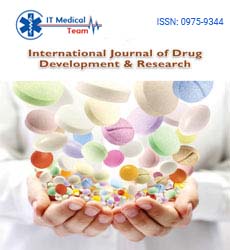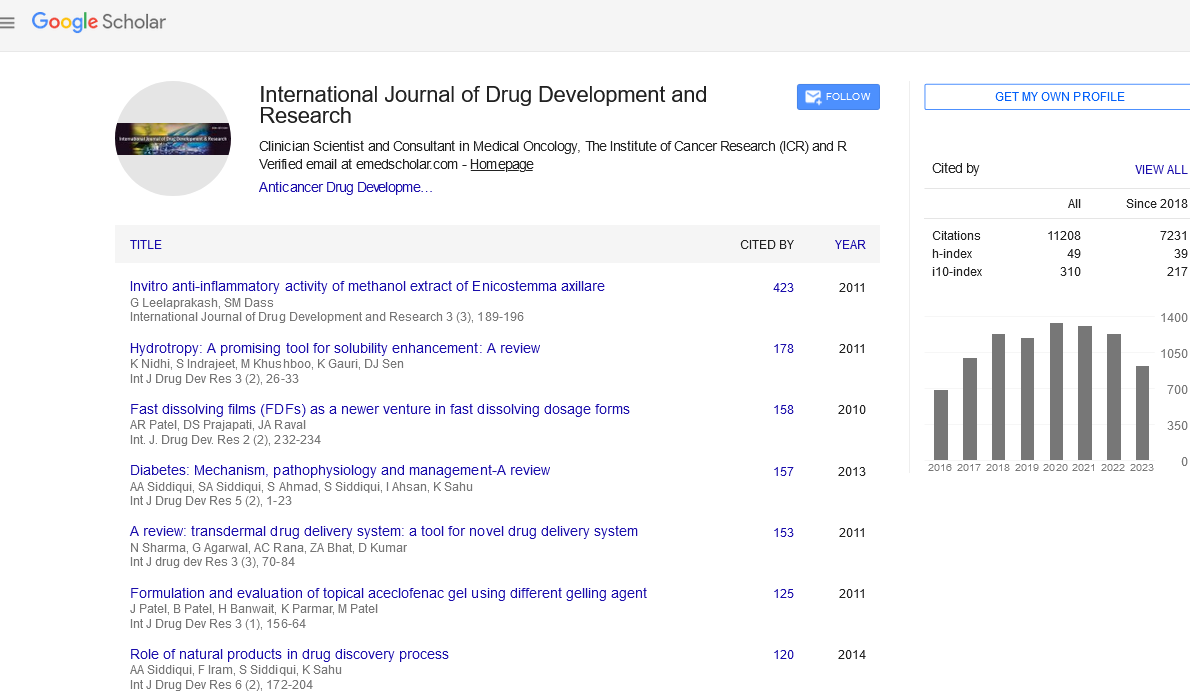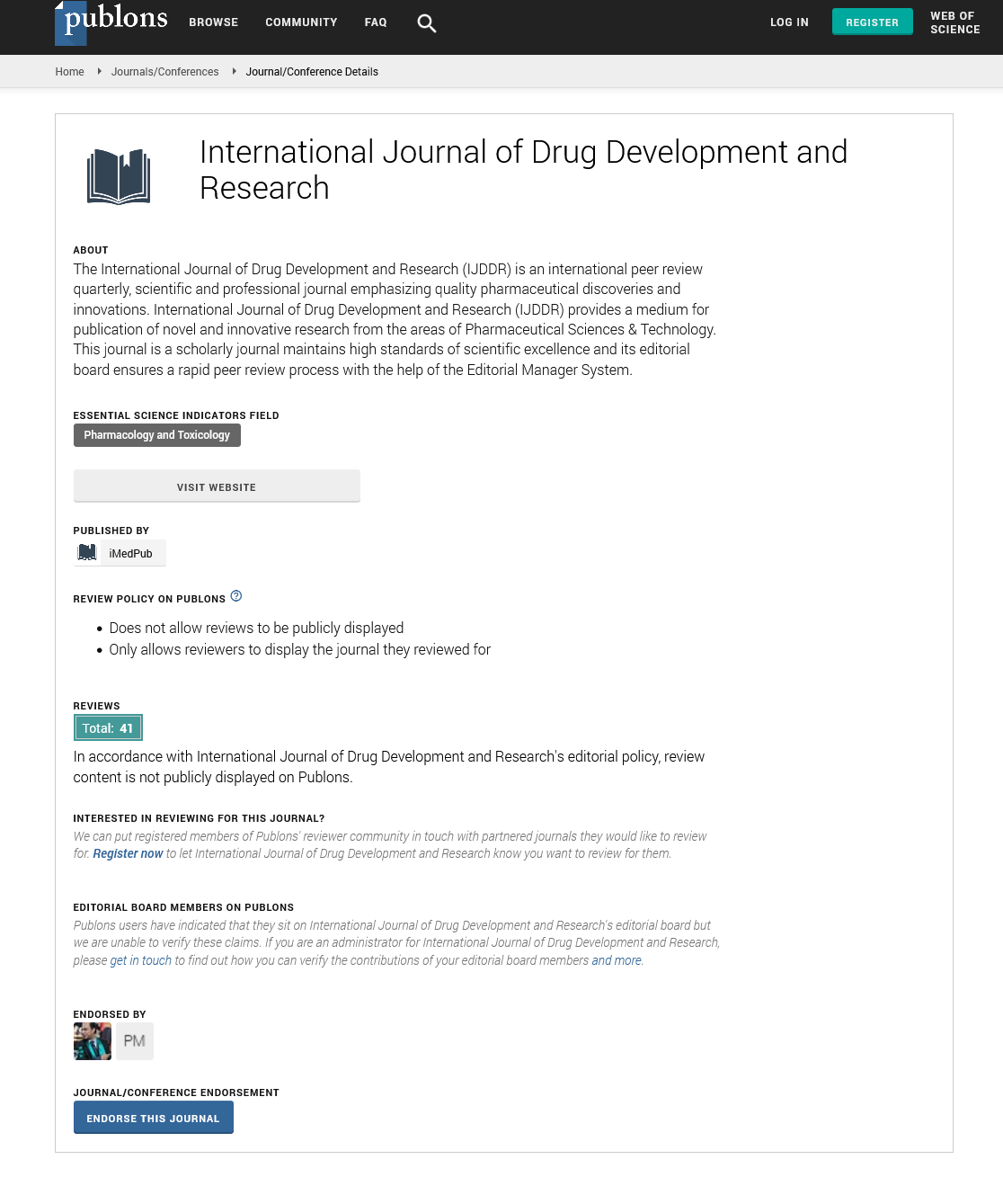Perspective - (2024) Volume 16, Issue 4
Exploring Drug Repurposing for Neurodegenerative Diseases: A Promising Frontier in Medical Research
Sachin Kothawade*
Department of Pharmacy, University of Pune, Pune, India
*Correspondence:
Sachin Kothawade, Department of Pharmacy, University of Pune, Pune,
India,
Email:
Received: 09-Jul-2024, Manuscript No. IJDDR-24-15041;
Editor assigned: 11-Jul-2024, Pre QC No. IJDDR-24-15041 (PQ);
Reviewed: 25-Jul-2024, QC No. IJDDR-24-15041;
Revised: 01-Aug-2024, Manuscript No. IJDDR-24-15041 (R);
Published:
08-Aug-2024
Introduction
Neurodegenerative diseases present a formidable challenge
in modern medicine, characterized by their progressive nature
and the debilitating impact on cognitive and motor functions.
Disorders like Alzheimer's disease, Parkinson's disease,
Amyotrophic Lateral Sclerosis (ALS), and Huntington's disease
not only affect millions worldwide but also lack effective
treatments that can halt or reverse their progression. Amidst
this medical landscape, drug repurposing has emerged as a
promising strategy to discover new therapeutic avenues swiftly
and cost-effectively.
Description
Drug repurposing, also known as drug repositioning or
reprofiling, involves identifying new uses for existing drugs that
are already approved or undergoing clinical trials for other
indications. Unlike traditional drug development, which typically
takes years and significant financial investment, repurposing
leverages existing safety profiles and pharmacokinetic data of
drugs, potentially accelerating their path to clinical application.
The need for innovative approaches
The traditional drug discovery process is arduous, often
characterized by high failure rates and substantial costs.
Neurodegenerative diseases, in particular, pose unique
challenges due to their complex etiology and the blood-brain
barrier that limits the delivery of therapeutics to the brain.
Moreover, the current therapies for these diseases often focus
on symptomatic relief rather than disease modification. Thus,
there is a pressing need for innovative approaches to identify
effective treatments that can alter the course of
neurodegeneration.
Advantages of drug repurposing in neurodegenerative
diseases
Reduced development time: Repurposing existing drugs
significantly shortens the development timeline compared to de
novo drug discovery. This acceleration is crucial given the urgent
need for effective therapies in neurodegenerative diseases.
Lower development costs: By bypassing early-stage safety
trials and leveraging existing data, repurposing can substantially
reduce the financial burden associated with drug development.
Cost-effectiveness makes it an attractive option for both
pharmaceutical companies and academic researchers.
Access to diverse mechanisms of action: Existing drugs often
target specific pathways or mechanisms that may have
relevance beyond their original indication. This diversity allows
for exploration of novel biological pathways implicated in
neurodegenerative processes, potentially uncovering unexpected
therapeutic benefits.
Safety profile: Drugs that have already been approved or
undergone clinical testing have well-established safety profiles,
reducing the likelihood of unexpected adverse effects and
facilitating faster regulatory approval processes.
Examples of successful drug repurposing
Several notable examples highlight the potential of drug
repurposing in neurodegenerative diseases:
Memantine: Originally approved for Alzheimer's disease,
memantine has shown promise in treating Amyotrophic Lateral
Sclerosis (ALS) by modulating glutamate neurotransmission.
Thalidomide: Known for its historical association with birth
defects, thalidomide is now used in treating multiple myeloma
and has shown potential in neurodegenerative diseases due to
its anti-inflammatory properties.
Rapamycin: Initially an immunosuppressant, rapamycin has
demonstrated neuroprotective effects in preclinical models of
Alzheimer's disease and Parkinson's disease through its ability to
regulate cellular metabolism and protein synthesis.
Emerging approaches and technologies
Advancements in technology and scientific understanding are
enhancing the scope and efficacy of drug repurposing efforts:
Computational approaches: Utilizing bioinformatics, artificial
intelligence, and machine learning algorithms to identify
potential drug candidates based on molecular structure,
pharmacological profiles, and disease mechanisms.
High-throughput screening: Screening large libraries of
existing drugs against disease-specific cellular or animal models
to identify compounds with therapeutic potential.
Target identification: Understanding the molecular targets
and pathways implicated in neurodegenerative diseases to guide
the selection of repurposed drugs with precision.
Challenges and future directions
Despite its promise, drug repurposing faces several challenges
in the context of neurodegenerative diseases:
Complex disease pathophysiology: Neurodegenerative diseases
involve intricate mechanisms and multiple pathological processes,
requiring drugs that can target these complexities effectively.
Ethical considerations: Repurposing drugs for new indications
raises ethical questions regarding patient consent, safety
monitoring, and regulatory oversight.
Intellectual property and market incentives: The lack of
financial incentives for repurposing drugs, especially when
patents have expired, can deter pharmaceutical companies from
investing in this approach.
Conclusion
Drug repurposing represents a transformative approach in the
quest for effective treatments for neurodegenerative diseases.
By leveraging existing therapeutic agents, researchers can
expedite the discovery of new treatments while minimizing costs
and safety risks. Continued advancements in technology,
coupled with a deeper understanding of disease mechanisms,
will further enhance the potential of repurposing strategies in
addressing the complex challenges posed by neurodegenerative
diseases. As ongoing research unfolds, the hope is that these
efforts will translate into tangible benefits for patients
worldwide, offering new avenues of hope and treatment where
previously there were few.
In summary, drug repurposing stands as a beacon of
innovation and efficiency in the pursuit of therapies that can
truly make a difference in the lives of those affected by
neurodegenerative diseases.
Citation: Kothawade S (2024) Exploring Drug Repurposing for Neurodegenerative Diseases: A Promising Frontier in Medical Research. Int J Drug
Dev Res Vol:16 No:4






